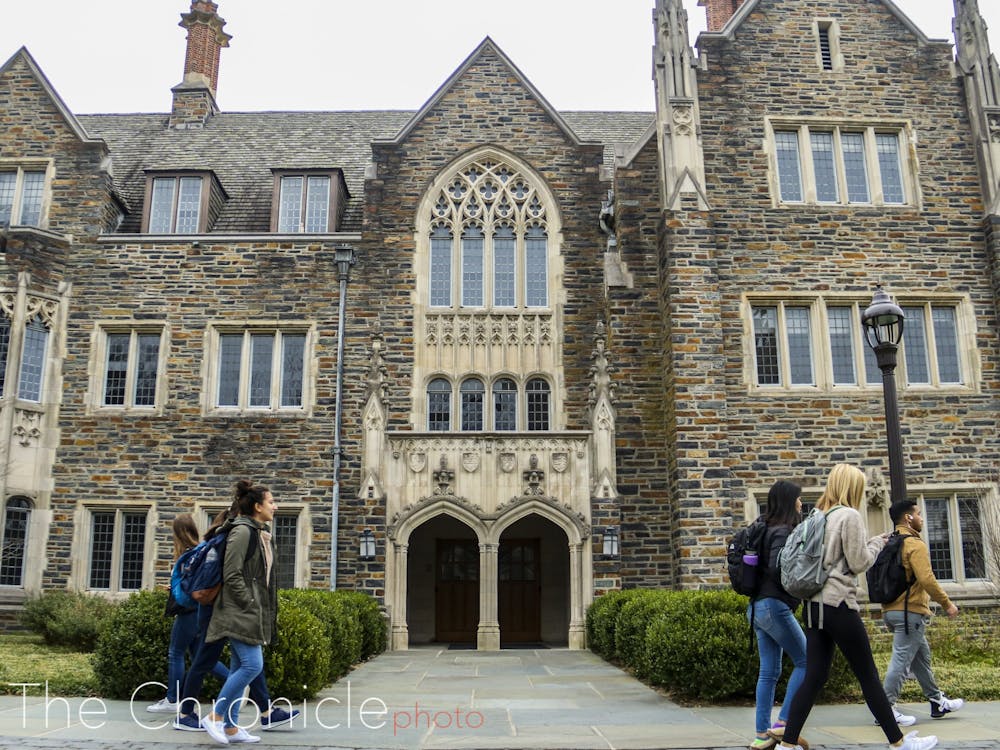Forbes Magazine recently named Duke the seventh-best educational employer for women in the United States, but what do female professors think about that accolade?
Forbes Magazine named Duke the 80th-best employer for women in the United States in July, out of 300 companies, and the seventh-best in the education industry, directly behind Harvard University. Recreational Equipment Inc., Unilever and Ulta Beauty won the top three overall spots, while Clovis Unified School District, University of Utah and Montgomery County Public Schools led in education.
Forbes worked with a market research company to survey 75,000 Americans—45,000 of them women—working for businesses with more than 1,000 employees. The survey asked questions about topics like workplace conditions, diversity, salary equity, the importance of image and career-development opportunities.
Forbes noted that participants’ responses reflect their feelings during March and April of this year—before many of the economic effects of the COVID-19 pandemic fully took hold.
Claudia Gunsch, associate vice provost for faculty advancement and the Theodore S. Kennedy associate professor of civil and environmental engineering, wrote in an email that part of her administrative role is “exploring how our university functions and ensuring that we build a community where women can thrive.”
She emphasized that although “Duke certainly is not perfect,” she believes that the university community is open to conversations and characterized by a “general desire to move forward.”
“I feel fortunate to be at a university where our Provost and 7 out of our 10 Deans are women. I am not aware of any other university with this record,” Gunsch wrote. “This sends a clear message that there is room for women to advance at Duke.”
She mentioned two Duke policies that she believes further illustrate positive aspects of the University’s culture: Duke’s membership in the Action Collaborative on Preventing Sexual Harassment in Higher Education, and its recent expansion of the parental leave policy to include both parents “if they both work at Duke and meet the eligibility criteria,” she wrote.
Despite these positives, Gunsch acknowledged that the University’s culture and policies are not perfect, particularly for those with “intersecting vulnerabilities (race, sexual orientation, gender identity, seniority, etc).”
“We have some work to do with respect to race and sexual orientation,” she wrote. “There have not been enough conversations on these topics to change the status quo. That being said, I am hopeful. The existing momentum and social movements we are experiencing will lead to some much needed changes.”
Maria Tackett, assistant professor of the practice of statistical science, arrived at Duke in the summer of 2018. In a message to The Chronicle, she shared that her experiences as a female-identifying faculty member have been overall very positive.
She wrote that she did not experience any issues during the hiring process.
“I felt I was treated fairly based on the rigor in which they evaluated me as a job candidate and based on how welcoming all members of the Duke administration and Statistical Science faculty were through each step of the process,” Tackett wrote.
Tackett expressed that she is especially pleased with the presence of women in leadership roles at Duke because they help to cultivate an atmosphere of equity.
“Part of what has shaped my experience here is the fact that women like Dean [Valerie] Ashby and Provost [Sally] Kornbluth have promoted a culture that respects women as colleagues and leaders,” she wrote.
Melissa Simmermeyer, senior lecturer of romance studies, who has been teaching Spanish classes at Duke since 1999, echoed Tackett’s thoughts about the importance of female leadership at the University.
“There are some women in key positions of power and they are making significant changes. Women are getting it done, and [have] done well! It takes a long time, though,” she wrote, noting that she arrived at Duke during the tenure of Nannerl Keohane, Duke’s first and only woman president. “She has really left her mark on Duke as well,” Simmermeyer continued.
Despite her favorable experiences with female leadership, Simmermeyer expressed that overall she has had both positive and negative experiences as a woman faculty member at Duke.
Simmermeyer explained that although she has experienced instances of mockery and disrespect, likely because of her gender, she is protected by her status as a white, cisgender, heterosexual woman from harms more often experienced by her peers who are “BIPOC, and/or LGBTQ+, and/or have disabilities, and/or who depend on the timely processing of visas, and/or who may be judged as less intelligent or worthy because it is clear that English is not their first language,” she wrote.
“I will forever carry in my memory particular instances at Duke when I know my BIPOC women friends were rendered invisible, not taken seriously, or made targets of micro and even macro aggressions,” Simmermeyer wrote.
Both Simmermeyer and Tackett acknowledged that many positive or negative aspects of their experiences at Duke could just as likely be extended to any other university. Tackett reflected that despite the efforts of any institution to promote gender equity in the workplace, societal norms and expectations can still put female-identifying employees at a disadvantage.
“One example of this is the fact that women have been disproportionately impacted by children being out of school during the COVID-19 pandemic,” she wrote.
Get The Chronicle straight to your inbox
Signup for our weekly newsletter. Cancel at any time.

Anna Zolotor is a Trinity senior and recruitment chair for The Chronicle's 118th volume. She was previously news editor for Volume 117.

